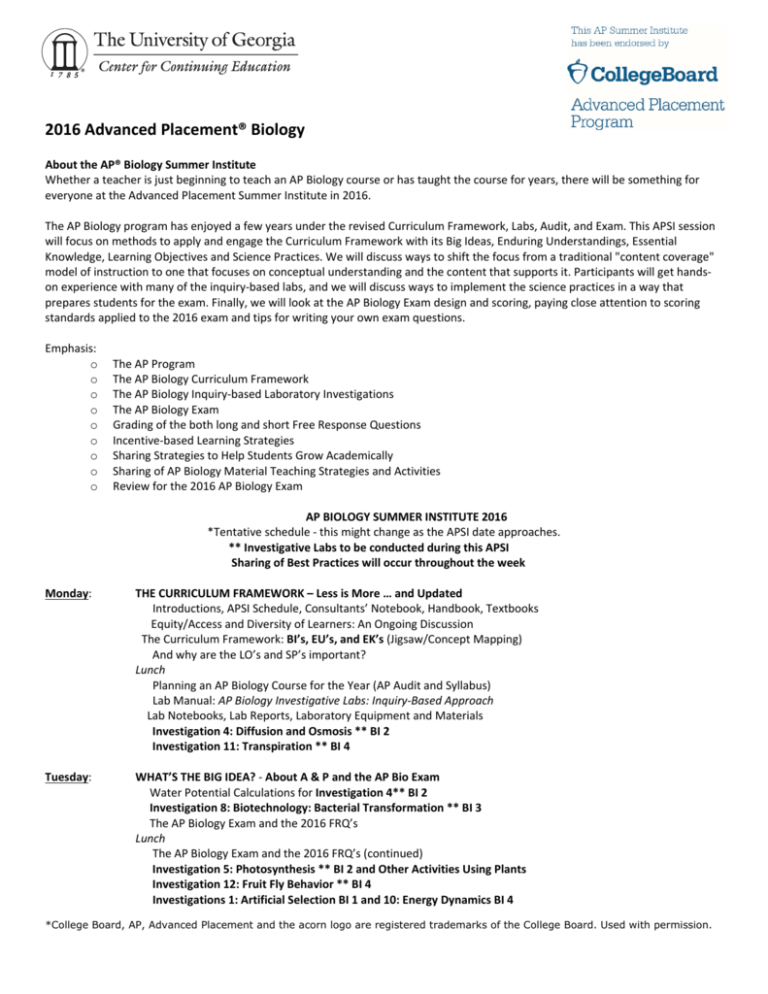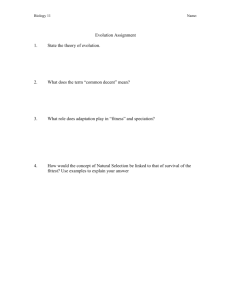2016 Advanced Placement® Biology - Georgia Center
advertisement

2016 Advanced Placement® Biology About the AP® Biology Summer Institute Whether a teacher is just beginning to teach an AP Biology course or has taught the course for years, there will be something for everyone at the Advanced Placement Summer Institute in 2016. The AP Biology program has enjoyed a few years under the revised Curriculum Framework, Labs, Audit, and Exam. This APSI session will focus on methods to apply and engage the Curriculum Framework with its Big Ideas, Enduring Understandings, Essential Knowledge, Learning Objectives and Science Practices. We will discuss ways to shift the focus from a traditional "content coverage" model of instruction to one that focuses on conceptual understanding and the content that supports it. Participants will get hands‐ on experience with many of the inquiry‐based labs, and we will discuss ways to implement the science practices in a way that prepares students for the exam. Finally, we will look at the AP Biology Exam design and scoring, paying close attention to scoring standards applied to the 2016 exam and tips for writing your own exam questions. Emphasis: o The AP Program o The AP Biology Curriculum Framework o The AP Biology Inquiry‐based Laboratory Investigations o The AP Biology Exam o Grading of the both long and short Free Response Questions o Incentive‐based Learning Strategies o Sharing Strategies to Help Students Grow Academically o Sharing of AP Biology Material Teaching Strategies and Activities o Review for the 2016 AP Biology Exam AP BIOLOGY SUMMER INSTITUTE 2016 *Tentative schedule ‐ this might change as the APSI date approaches. ** Investigative Labs to be conducted during this APSI Sharing of Best Practices will occur throughout the week Monday: THE CURRICULUM FRAMEWORK – Less is More … and Updated Introductions, APSI Schedule, Consultants’ Notebook, Handbook, Textbooks Equity/Access and Diversity of Learners: An Ongoing Discussion The Curriculum Framework: BI’s, EU’s, and EK’s (Jigsaw/Concept Mapping) And why are the LO’s and SP’s important? Lunch Planning an AP Biology Course for the Year (AP Audit and Syllabus) Lab Manual: AP Biology Investigative Labs: Inquiry‐Based Approach Lab Notebooks, Lab Reports, Laboratory Equipment and Materials Investigation 4: Diffusion and Osmosis ** BI 2 Investigation 11: Transpiration ** BI 4 Tuesday: WHAT’S THE BIG IDEA? ‐ About A & P and the AP Bio Exam Water Potential Calculations for Investigation 4** BI 2 Investigation 8: Biotechnology: Bacterial Transformation ** BI 3 The AP Biology Exam and the 2016 FRQ’s Lunch The AP Biology Exam and the 2016 FRQ’s (continued) Investigation 5: Photosynthesis ** BI 2 and Other Activities Using Plants Investigation 12: Fruit Fly Behavior ** BI 4 Investigations 1: Artificial Selection BI 1 and 10: Energy Dynamics BI 4 *College Board, AP, Advanced Placement and the acorn logo are registered trademarks of the College Board. Used with permission. Wednesday: MORE LABS –From Genes & Chromosomes to Proteins & Traits Investigation 9: Biotechnology: Restriction Enzyme Analysis of DNA ** BI 3 Investigation 3: BLAST BI 1 (Are there alternatives?) Lunch Investigation 6: Cellular Respiration ** BI 2 Investigation 13: Enzyme Activity** BI 4 Investigation 7: Cell Division: Mitosis and Meiosis BI 3 Thursday: MATHEMATICS and STATISTICS: Biology’s Next Microscope Content Update Lecture by Guest Speaker Mathematics and Statistics Examples from AP Exams 2013‐2016 Lunch Calculating Transformation Efficiencies from Investigation 8 BI 3 Calculating Restriction Fragment Lengths Investigation 9 BI Investigation 2: Mathematical Modeling: Hardy‐Weinberg BI 1 (An Alternative Model) College Board Evaluations and APSI Certificates and USB Drive *These are only possible topics. We will discuss which topics you need most and concentrate there. What to bring: Items you should bring during the week include: a laptop computer or tablet (recommended – not required) a copy of your school’s academic calendar a current AP Biology syllabus closed‐toe shoes for laboratory work goggles for laboratory work highlighter(s) An investigation you used (or would like to use) with your students beyond what is found in the AP Biology College Board Lab Manual or an assessment that allowed you the opportunity to measure the learning objectives from the biology curriculum. comfortable clothes and shoes for walking in the summer heat a light sweatshirt or sweater in case you get chilly in the AC Instructors: Patricia Mote taught biology at the high school level for over thirty years including serving as department chair for many of these years. She also was an adjunct instructor at the college level during most of these years. She holds degrees in Microbiology, Genetics, and Science Education from work at the University of Georgia and Emory University. She taught AP Biology for over 20 years. As a consultant for The College Board, she has conducted AP Biology one‐day workshops and summer institutes at various schools and universities around the country since 1989. She has been involved with the AP Reading to score the free response questions from the AP Biology Exam since 1992, serving as reader, table leader, question leader, and exam leader. She has written multiple‐choice and free response questions for former AP Exams and is now developing questions for the new format of the AP Biology Exam. During her career as a high school teacher she was named High School Teacher of the Year several times and also Teacher of the Year for her school district. She was selected the NABT Outstanding Biology Teacher of the Year for Georgia and a Tandy Technology Scholar. In 2003, she received the Siemens Award in Biology for her work with minority students in the AP program. She has written and edited various teacher guides for anatomy and physiology textbooks and for AP Biology textbooks. She has recently had items published in The College Board’s Materials for Professional Workshops. She serves as an editor for articles for *College Board, AP, Advanced Placement and the acorn logo are registered trademarks of the College Board. Used with permission. The American Biology Teacher and helped edit an earlier edition of the AP Biology Lab Manual for Students published by The College Board. She has edited numerous editions of Human Anatomy and Physiology and Biology textbooks. Other publications include articles for several microbiology journals from research conducted at the Centers for Disease Control in Atlanta and several instructor’s guides to be used with AP Biology textbooks. And for over 15 years, she has been teaching a summer molecular biology program “Bio @ TECH” at the Georgia Institute of Technology in Atlanta. Patricia resides in Atlanta, GA, and is currently a lecturer of Biology for Majors Biology, Non‐majors Biology, and Human Anatomy and Physiology courses at Georgia State University. Richard Patterson is currently in his 41st year of teaching high school biology, the last 38 years at Athens Academy in Athens, GA. He has taught AP Biology for 35 of those years. He holds a BS in Botany and a MEd in Science Education, both from the University of Georgia. He has served as a consultant for the College Board conducting over 60 one‐day up to two‐week AP Biology Teacher Workshops and Institutes throughout the nation. He has served as a question item writer for the Educational Testing Service for both the AP Biology and NEAP exams, and has served as a Reader, Table Leader and Question Leader for the College Board at the AP Biology Essay Readings since 1986. At Athens Academy he serves as the Science Department Head in the Upper School, teaches several sections of Biology Honors for 9th graders, and usually two sections of AP Biology for seniors. He serves on several standing committees, is the Faculty Advisor to the Honor Council, and over the years has been a Head Coach in Boys Varsity Soccer and Girls Volleyball. He was named Region Coach of the Year twice in volleyball. Now in the spring, he is an assistant Head Coach of the Track & Field team with specialization in the shot put and discus. In that role he has had the honor of coaching 35 Region Champions, 14 State Champions, and one girl who placed 6th in the World Junior Olympics in the shot. Richard was named Outstanding Biology Teacher of the Year for the State of Georgia in 1988 and in 2008, and won the 2006‐7 Siemens Award for Advanced Placement for Georgia. He has been chosen by Athens Academy STAR students to be their STAR Teacher eleven times. He authored an article in American Biology Teacher magazine in March 1998, wrote a major revision of the Dissolved Oxygen lab in the “classic” curriculum lab manual, and an article on preparing students for the AP Biology Exam free response questions about labs in the College Board’s 2004‐05 Professional Development for Biology Workshop Materials book. Richard recently celebrated his 40th anniversary with his wife, Georgia, by taking a cruise to Alaska. *College Board, AP, Advanced Placement and the acorn logo are registered trademarks of the College Board. Used with permission.






